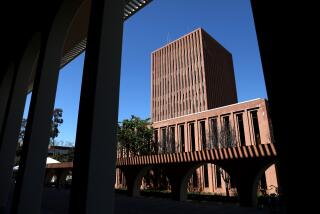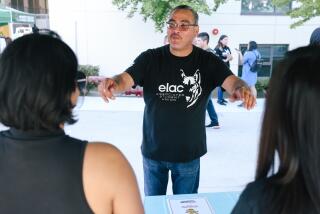University Via Home Computer Puts Students in a Class by Themselves
- Share via
SAN FRANCISCO — Hate getting up at the crack of dawn for that early-morning class? Can’t stand the scramble for campus parking? Crowded classrooms getting you down?
Your problems are over. At the Electronic University you can snag that sheepskin without once setting foot on a college campus. Enroll in TeleLearning Systems’ program and a college degree is as close as your home computer.
“It’s that easy,” said Ronald F. Gordon, founder and president of TeleLearning Systems, an educational telecommunications program that connects a student’s personal computer with an instructor.
The courses range from right brain drawing to information systems for management and cost between $45 and $295. The 2-year-old Electronic University offers two associate degrees, two bachelor’s degrees and three graduate programs.
“It doesn’t matter if you live on one side of the continent and the school is on the other end,” said Walter Rowen, the university’s director of public relations. “As long as you have a computer and a telephone, you’re all set.”
“Of course, the Electronic University doesn’t issue degrees,” Rowen said. “We just hook the student up with the school that’ll grant the degree.”
Imagine taking an art course from the leading expert at Yale, a computer science class from a wizard at Stanford and public policy from a Harvard professor, said Gordon, the former chief executive officer of Atari Inc.
“One day with the Electronic University, it’ll be possible to take a course from leading authorities in various fields,” Gordon said.
At present, only two accredited institutions--Thomas A. Edison State College of Trenton, N.J., and City University of Bellevue, Wash.--provide classes for credit on the network.
Electronic U. obviously is not for everyone, Gordon said. For one thing, extracurricular activities are a bit slim. There are no fraternities or sororities, dormitories or football games.
“There’s just you and the computer,” he said. “But for thousands who for one reason or another can’t finish a degree program because of the restraints of attending class on campus, the Electronic University might be the answer.”
Gordon said the San Francisco-based educational network primarily caters to the disabled, those living in remote areas and people who are too involved in their career to take time out to go back to school.
To take a course, students must own an IBM, Commodore 64, or Apple II home computer and a modem that allows them to connect to the college instructor’s computer.
Instructors relay assignments through the computer, where it is placed into an electronic mailbox, allowing students to retrieve lessons at their convenience.
“One student might like to work early in the morning whereas another might work late into the night,” Gordon said. “It offers great flexibility.”
Questions on the material are entered into the computer and answered by the instructor within 24 hours. For “live” conversations by computer, instructors can be reached during office hours, Rowen said.
Proctored Tests
After preparing with TeleLearning courses, students qualify for degrees by passing non-computerized tests prepared by faculty members. All exams are proctored and administered by authorities at a local college or library.
The Electronic University, which currently serves about 14,000 students, has drawn praise from Reagan Administration officials, including Vice President George Bush and former Education Secretary Terrel H. Bell.






